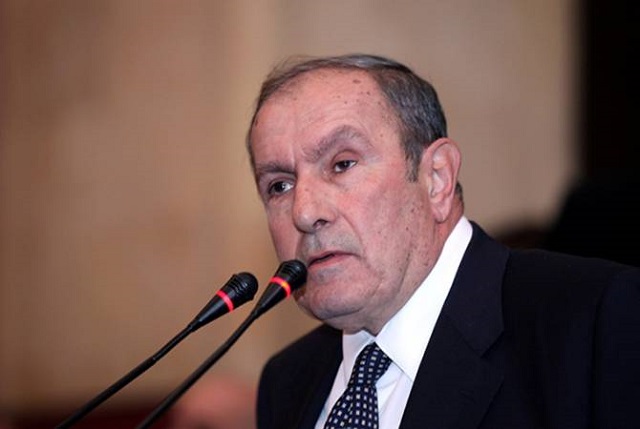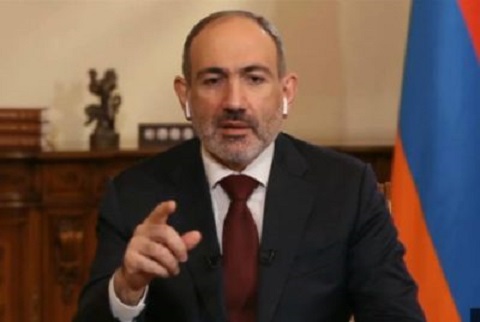YEREVAN (RFE/RL) — Armenia’s constitution stipulates that such elections can be held only if the prime minister resigns and the parliament twice fails to elect a new head of the government within two weeks. Prime Minister Nikol Pashinyan and his cabinet formally stepped down for that purpose on April 25.
Deputies representing the parliament’s pro-government majority did not reelect him or install another premier when they first voted on May 3. They made sure that the second vote yields the same result.
This means that the National Assembly will be automatically dissolved. It will formally retain its legislative powers pending the election of a new parliament next month.
The two opposition parties represented in the outgoing legislature agreed to this scenario during talks with Pashinyan held earlier this spring.
Read also
Pashinyan first expressed readiness to hold early elections in December amid angry anti-government protests triggered by Armenia’s defeat in a six-week war with Azerbaijan. The Armenian opposition blamed him for the defeat and demanded that he hand over power to an interim government.
Pashinyan and his My Step bloc stated on February 7 that they see no need for snap polls because of what they called a lack of “public demand.” A coalition of opposition parties resumed street protests in Yerevan on February 20.
Five days later, the Armenian military’s top brass issued a statement accusing Pashinyan’s government of misrule and incompetence and demanding its resignation. The prime minister rejected the demand as a coup attempt. He went on to announce on March 18 that the snap polls will take place after all.
Pashinyan defended his track record on Monday, saying that his administration has achieved the key aim of the “velvet revolution” that brought him to power three years ago.
“I regard what I just said as our biggest achievement: the citizens of the Republic of Armenia feel that they are the masters of our country. At the end of the day, this is what the nonviolent, Velvet Revolution of 2018 was done for and that goal has been achieved,” he said, speaking in the parliament.
Pashinyan claimed to have carried out important “institutional reforms,” seriously reduced tax evasion and made “revolutionary changes” in the country’s prison system. He also insisted that the current Armenian government does not control the judiciary unlike the previous ones.
Pashinyan described the autumn war in Nagorno-Karabakh as the “biggest problem” of his three-year tenure. He claimed that the war was already inevitable when he swept to power, implicitly accusing Armenia’s former leaders of mishandling the Karabakh peace process.
The 45-year-old former journalists similarly blamed former Presidents Serzh Sargsyan and Robert Kocharyan for Azerbaijan’s victory in the six-week war when he addressed the National Assembly last month.
Sargsyan and Kocharyan had led Karabakh during its successful 1991-1994 war with Azerbaijan. Like virtually all Armenian opposition leaders, the ex-presidents hold Pashinyan responsible for the outcome of the second war stopped by a Russian-mediated truce accord last November.
Another former president, Levon Ter-Petrosian, charged last week that Pashinyan and his political team have “failed in all areas.”
Pashinyan scoffed at such claims. “We take many things for granted,” he said. “After that catastrophe [of November 2020] not a single gunshot has been fired in Armenia. Do you realize what this means? Could this have happened under a government that has failed in all areas of governance?”
The prime minister also said that unlike their predecessors he and other senior Armenian officials have not enriched themselves by sharing in the profits of lucrative businesses.
Taguhi Tovmasyan, an independent lawmaker who left the ruling My Step bloc in November, countered that none of the country’s former rulers has been convicted or even accused of such corrupt practices under the current authorities.
“Who and what has benefited from whose business?” Tovmasyan asked. “And how have they been punished in the post-revolution Armenia for the sake of restoring justice?”
Calls for Alliance of Former Leaders
Ter-Petrosian defended on Friday his public calls for Armenia’s two other former presidents to form an electoral alliance with him and jointly try to oust Prime Minister Nikol Pashinyan’s “criminal and nation-destroying regime.”
Ter-Petrosian revealed on Wednesday, May 5, that he floated the idea at a March 25 meeting with the two. He said Kocharyan rejected it out of hand while Sargsyan “did not express any opinion.” He said he is “publicly repeating my proposal” because he believes Pashinyan’s reelection would spell further trouble for Armenia.
Both ex-presidents swiftly turned down the proposal, saying that they are planning to enter other alliances ahead of the snap parliamentary elections expected in June.
Ter-Petrosian’s readiness to team up with the two other ex-presidents is remarkable given the long history of mutual antagonism between them. For many years he was highly critical of his successors’ policies and track records.
The three men met in October for the first time in decades to discuss ways of stopping the war in Nagorno-Karabakh. Ter-Petrosian and Kocharyan offered to jointly travel to Moscow for urgent talks with Russian leaders.
Pashinyan reportedly refused to authorize them to negotiate on behalf of his administration. He later questioned the sincerity and seriousness of the ex-presidents’ initiative, prompting angry reactions from them.
Like other opposition figures, all three ex-presidents blame Pashinyan for Armenia’s defeat in the six-week war. Ter-Petrosian said in March that Pashinyan must step down and “at least temporarily” leave the country to end its post-war political crisis. The prime minister reacted scathingly to that statement.
Main Photo Caption: Levon Ter-Petrosian




















































